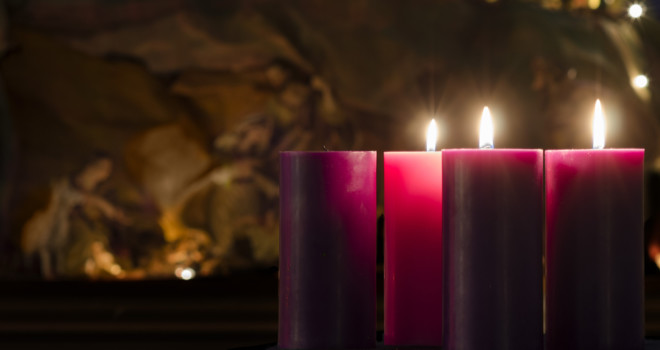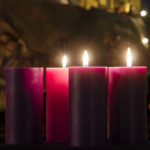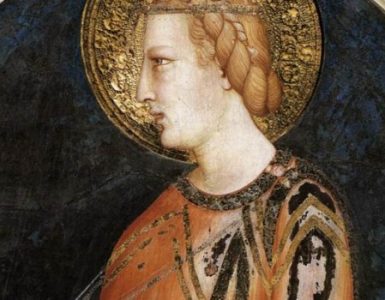On the Third Sunday of Advent, the Church calls us to rejoice, even though our waiting and preparation aren’t over yet. Why?
Gospel (Read Jn 1:6-8, 19-28)
Today we have another description of the work of John the Baptist before the public appearance of Jesus at the Jordan River. In addition to calling the people of Judea to repent, John also had to answer questions about himself. We need to know that expectation of the Messiah’s coming was at fever pitch in first century Judea. Centuries earlier, the prophet, Daniel, was given a message from the angel, Gabriel, with a numbered calculation of years that would pass between the Exile of Judah in Babylon and the appearance of God’s “anointed one.” During this time (about 500 years), four great Gentile kingdoms would rise and fall. The last of these kingdoms would actually be turned over to “the saints of God” and become His kingdom on earth. Doing the math of Daniel’s prophecy, the Jews of John the Baptist’s day knew that the time had arrived. It is no wonder, then, that the religious leaders asked him point blank: “Who are you?” Surely they were wondering if he were the promised (and imminent) Messiah. He told them: “I am not the Christ.”
The Jews also asked him if he were Elijah or “the Prophet.” Why did they ask this? The prophet, Malachi, had foretold that Elijah would make final preparations for the arrival of the Messiah (see Sir 48:1; Mal 4:5). John told the Jews he was not Elijah in the flesh, but we do know that his work was done in the spirit of Elijah (who, in his own day, centuries earlier, had called the people of Israel to repentance and decision). Jesus later made that clear (read Mt 11:14). When the Jews asked John if he were “the Prophet,” they meant the Mosaic figure foretold in Deut 18:15-19. John was not that messianic prophet; Jesus fulfilled this role Himself as the new Moses (see Jn 4:20-26; 6:14; 7:40). The Jews were on the right track in their questioning, but the Baptist had to clear up the mystery for them.
The priests and Levites quizzing John were right to believe that he was a prophetic fulfillment of somebody. So, he pointed them to one of Isaiah’s prophecies, telling them, “I am ‘the voice of one crying out in the desert, make straight the way of the LORD.’” His was a work of preparation and anticipation for the Messiah. He assured the Jews that the “One who is coming after me” would be the One they sought, the One who, ironically, was already among them but “whom you do not recognize.” John knew that although he was himself sent by God, he would not compare to the One whom the Jews sought, the One “whose sandal strap” he was “not worthy to untie.”
Now that we understand this, we can return to the first few verses of this reading to consider why the Church calls us to rejoice in this penitential season, one that has not yet liturgically ended. See how St. John the Evangelist describes the Messiah here—not as a figure of prophetic fulfillment but as “the light.” In verses not included in today’s reading, St. John tells us that “In [Jesus] was life, and the life was the light of men. The light shines in the darkness, and the darkness has not overcome it.” (Jn 1:4-5)
That’s it! Before the coming of Jesus, men sat in darkness, waiting for the “light” that was still far off in the future. Now, however, in the time after His coming, everything has changed. The Light came into the world, in the Incarnation, and stayed for good. Yes, Jesus did, after His Resurrection, ascend from His earthly life to His throne next to His Father in heaven. However, with His gifts both of the Holy Spirit (creating the Church, His Mystical Body) and the Eucharist (His sacramental Real Presence among us), His Light remains. Darkness (no matter how dark it becomes) can never overcome this Light. For now, we are simply waiting for this Light to grow into its fullness—the bright, blinding glory of the Second Coming. That is what we re-enact when we light the candles of Advent. Each week the light gets brighter and brighter; when Christmas arrives, it is a complete circle of light, dispelling the darkness. So it is in time and space, as we await our Lord’s return. Even when circumstances and difficulties press in on us, creating a cloak of darkness, we know now that the Light of Christ can never be extinguished. That is why, although our work of waiting and preparation in Advent has not yet ended, we light the rose-colored candle today.
There is only one appropriate response to this Good News: Rejoice!
Possible response: Lord Jesus, sometimes I am like the Jews of John’s day—although You are already among us, I don’t recognize you. Help me see Your light today.
First Reading (Read Is 61:1-2a, 10-11)
Isaiah was a prophet both of God’s punishment for sin and His comfort of salvation for Israel. In the first few verses of our reading, Isaiah announces that the LORD has anointed him to bring “glad tidings” to the captives of the Babylonian Exile, because he announces to them the future end of their imprisonment and a restoration to their homeland. Ultimately, however, these words were meant to describe the work of liberation that Jesus would do for sinners. Our Lord used exactly these words to announce the beginning of their fulfillment, when He read them aloud in the synagogue in Nazareth and told those assembled there: “Today, this Scripture is fulfilled in your hearing” (Lk 4:21).
In the next few verses, we see Isaiah’s description of what God’s restoration of His people produces in them: “I rejoice heartily in the LORD, in my God is the joy of my soul.” We are still rejoicing! On this third Advent Sunday, the Church reminds us that this marvelous clothing of sinners in the beautiful garments of salvation has already begun (take note of the richly adorned priestly garments worn today at Mass). Even though we must wait and work for its fulfillment, we can, today, rejoice in what has already happened and all that lies ahead.
Possible response: Lord Jesus, thank You for this day of refreshment in Advent. Let me not forget that Your victory of liberation has already begun.
Psalm (Read Lk 1:46-50, 53-54)
How appropriate that on this rose Sunday, we pray the words of Our Lady in her own song of rejoicing when she visited her cousin, Elizabeth. It is worth noting that Mary sings this song not at the time of the Annunciation, when she first hears the message of Gabriel, but when she visits God’s people, represented by Elizabeth and the son in her womb, John the Baptist. Mary carries our Lord to His people, and they recognize that He is the One for whom all Israel has waited. She bursts into a song of praise, because God has shown favor to the lowly and has kept all His promises of mercy and help to His people in Jesus. Mary is the first of our race to know the fullness of what Jesus will do in all of us someday. Her words are truly rich in history and should find welcome on our own lips as we answer the Church’s call today with them: “My soul rejoices in God.”
Possible response: The responsorial is, itself, a response to our other readings. Read it again prayerfully to make it your own.
Second Reading (Read 1 Thess 5:16-24)
St. Paul, in his epistle, reminds us that since we live after the Incarnation and in the Redemption Jesus won for us, we have no alternative but to “Rejoice always.” No matter how long we have to wait for the return of Jesus and the resolution of “all circumstances,” we can “give thanks.” We are anchored in the victory of Jesus. God wants us to be with Him! See that St. Paul says our part is to cling to what is good and “refrain from every kind of evil.” When we do, we can trust God to make us “perfectly holy…preserved blameless for the coming of our Lord Jesus Christ.” Because God is “faithful” and will “accomplish” this, let us heartily respond to the Church’s call today: Rejoice!
✠
Possible response: Lord Jesus, as I begin the last week in Advent, please show me where I am weak for evil; strengthen me to cling to the good.












